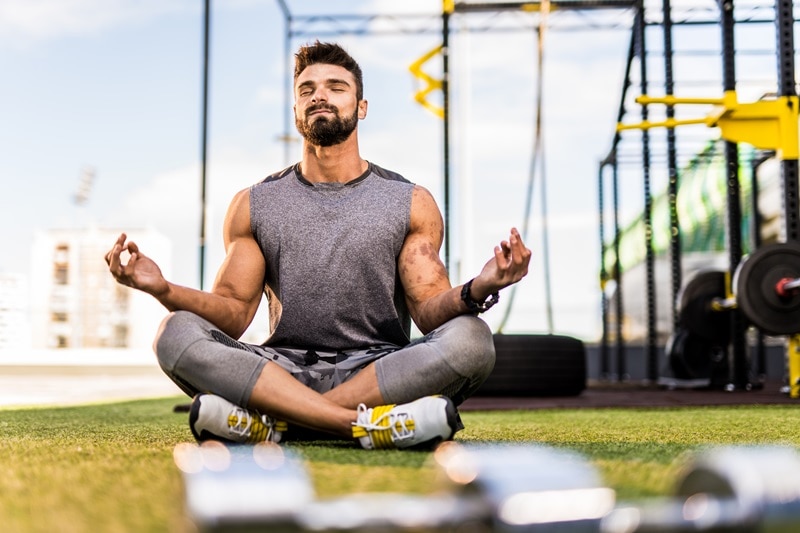[vc_row][vc_column][vc_column_text]When it comes to fitness or athletic performance, most of us focus on training our bodies—but what about your mind?
Psychologists define
mental toughness as the ability to concentrate on the task at hand, achieve goals in the face of pressure, rebound from failures, or overcome challenges, and stay motivated to ultimately succeed. One way to build that mental toughness is sports psychology.
This is a great tool for tuning into your mind, supporting your long-term health goals and being your own cheering squad! Let’s discuss what this means, why it matters and how to use sports psychology to support your own unique fitness goals.

What Is Sports Psychology?
Sports psychology examines how control over your thoughts and emotions can make it easier to push through mental barriers, elevate your athletic performance and create habits for long-term success.
According to the
PLOS One Journal, sports psychology dates back almost 200 years, and consistently practicing this discipline is one of the most effective strategies to optimize your results—even more so than lifestyle factors such as healthy eating.
Working with a sports psychologist will teach you practical, actionable techniques to improve your mental stamina and emotional regulation in intense physical moments. These techniques can include visualization, mindfulness, goal orientation, motivational self-talk, attention training, conscious breathwork and progressive muscle relaxation.
Sports psychology
activates your brain like the muscle it is, so you have the tools to quickly process information and calmly muster up focus, determination and resilience for optimal fitness results. It can also make you feel more confident in your own abilities. This has been shown to increase vigor, reduce the fear of failure, alleviate stress, delay the onset of fatigue and lower the risk of burnout.
How Can You Benefit from Sports Psychology?
While the most accomplished, talented athletes use sports psychology to drive success, people who simply love to move their body and workout can build mental strength and stamina with this tool too.
Sports psychology isn’t just about “pushing through” the hard moments. It’s about learning to trust your capabilities and tap into your inner source of support and encouragement. Here's why this matters:
- Performance Optimization: Sports psychology teaches you to remain calm under pressure, so you can concentrate on the next action and continue making consistent strides, especially in intense or high-stakes situations. This will help you sustain the physical and mental exertion to reach your target outcome.
- Injury Rehabilitation: Sports psychology can also be a valuable resource to help you recover from fitness-related injuries. According to the Behavioral Sciences Journal, this intervention nurtures a positive mindset, emotional acceptance, resilience in the face of setbacks and confidence to return once the injury heals.
- Stress and Anxiety Reduction: Sports psychology interventions such as mindfulness, breathwork and visualization can relax the autonomic nervous system, which reduces stress and anxiety. This will ease the fear of failure or the burden to perform, so you’re free to have fun, do your best and enjoy the process.
- Increased Self-Efficacy: Sports psychology techniques can help you reframe doubts into opportunities for growth. In fact, there’s a correlation between mental toughness and self-efficacy—the confidence to learn from mistakes, solve problems, combat obstacles, celebrate progress and believe in your skills and strengths.
- Clear, Realistic Goal Setting: Sports psychology is an excellent tool for identifying the specific goal you want to achieve and then implementing a concrete plan to reach it.
How to Work Sports Psychology into Your Fitness Routine
You don’t necessarily need to hire a sports psychologist to start benefiting from this practice. Let’s dive into some actionable ways to build sports psychology interventions and techniques into your current fitness routine.
Use pre-workout visualization
Spend a couple of minutes before each workout mentally envisioning what you want to accomplish. Imagine how it feels to do each exercise with focus, strength and precision. Then, visualize the sensation of finishing the workout and feeling proud of yourself for a job well done.
Concentrate on positive self-talk
Replace negative beliefs like, “I can’t do this,” or “I’m too tired,” with affirmations such as “I’m stronger than I used to be,” or “I’m letting my body lead.”
Keep a consistent fitness journal
Once you finish a workout, record your mental state before, during and after. Track consistent patterns in your motivation,
confidence, performance and energy levels. This will help create more awareness around what’s working and what still needs improvement.
Establish a series of micro goals
Instead of only focusing on distant, long-term outcomes, set weekly (or even daily) micro goals. This could be as simple as, “I will stretch for five minutes before all of my exercise circuits this week.” Small, incremental goals help increase momentum over time.
Integrate mindfulness practices
Techniques like full-body scans or deep conscious breathing make it easier to stay present during the workout and connected to your own body. This will help you tune out distractions, pay attention to the correct form of each exercise and enjoy the feeling of movement.
Create a motivational anchor
Link the start of your workout routine to an intentional cue such as turning on a workout playlist or reaching for your sneakers. This anchor will boost motivation and reinforce habits by establishing a consistent routine that your brain associates with positive, goal-oriented action.
Reward effort—not just results
Celebrate all your hard work, even if the results are slow to materialize. This builds resilience and a growth mindset, both of which are more sustainable than only outcome-based incentives.
Work on your mental and physical strength
Think of your body as the engine and your brain as the driving force behind it. Sports psychology is just one tool you can use to empower your health journey, elevate your fitness performance, increase mental stamina and nurture holistic well-being.[/vc_column_text][/vc_column][/vc_row][vc_row][vc_column][vc_text_separator title="Featured Products" border_width="2"][vc_row_inner equal_height="yes" content_placement="middle" gap="35"][vc_column_inner width="1/3"][vc_single_image image="185238" img_size="full" alignment="center" onclick="custom_link" img_link_target="_blank" css=".vc_custom_1749136928573{padding-right: 7% !important;padding-left: 7% !important;}" link="https://www.vitacost.com/ultima-replenisher-tea-fresher-variety-pack"][/vc_column_inner][vc_column_inner width="1/3"][vc_single_image image="185237" img_size="full" alignment="center" onclick="custom_link" img_link_target="_blank" css=".vc_custom_1749136944105{padding-right: 7% !important;padding-left: 7% !important;}" link="https://www.vitacost.com/honey-stinger-organic-gel"][/vc_column_inner][vc_column_inner width="1/3"][vc_single_image image="185236" img_size="full" alignment="center" onclick="custom_link" img_link_target="_blank" css=".vc_custom_1749136956848{padding-right: 7% !important;padding-left: 7% !important;}" link="https://www.vitacost.com/force-factor-creatine-monohydrate-gummies"][/vc_column_inner][/vc_row_inner][/vc_column][/vc_row]





